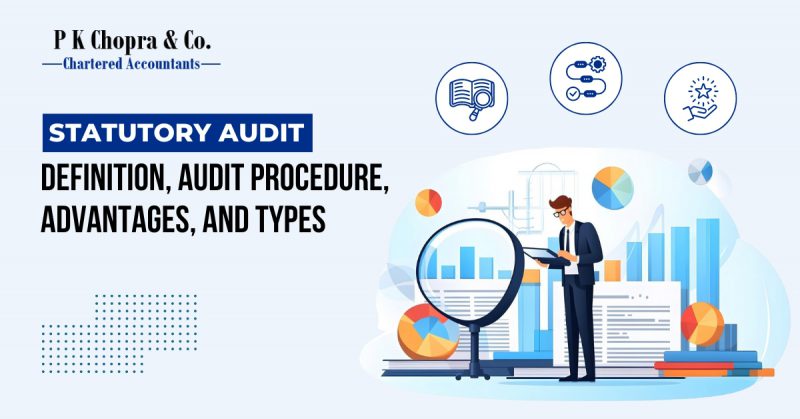Statutory Audit – Definition, Audit Procedure, Advantages , and Types
Statutory Audits play a critical role in the financial ecosystem of any country, ensuring the accuracy and reliability of financial statements. In India, statutory audits are mandated by law for certain organizations to provide transparency and maintain trust in their financial disclosures. This blog covers everything you need to know about statutory audits in India, including their purpose, process, and importance.
Meaning of a Statutory Audit
A Statutory Audit refers to a legally required review of the accuracy of a company’s or institution’s financial records. In India, this type of audit is mandated under several laws such as the Companies Act, 2013, and is conducted by an independent auditor to ensure that the financial statements of an organization provide a true and fair view of its financial position.
How Does a Statutory Audit Function?
The primary purpose of a statutory audit is to verify that financial statements comply with the necessary accounting standards, regulatory requirements, and legal frameworks. An independent auditor is appointed to conduct a thorough examination of the company’s financial statements, including its balance sheet, profit and loss account, and cash flow statement. The auditor also checks for any discrepancies, errors, or potential fraud.
Advantages of Statutory Audit
- Financial Transparency: It ensures that a company’s financial records are transparent and accurate, thereby increasing the confidence of stakeholders, investors, and the public.
- Legal Compliance: Statutory audits ensure that companies comply with laws and regulations, avoiding potential legal issues.
- Fraud Detection: Auditors often identify financial irregularities, helping in the detection and prevention of fraud.
- Improved Accountability: A statutory audit enforces discipline within an organization, encouraging better financial management and control.
Statutory Audit Procedure
The statutory audit procedure typically includes the following steps:
- Appointment of Auditor: An independent auditor is appointed by the shareholders or members of the company.
- Planning the Audit: The auditor develops an audit plan, which includes understanding the business, identifying potential risks, and determining the scope of the audit.
- Collection of Evidence: The auditor gathers sufficient and appropriate audit evidence by reviewing financial documents, transactions, and systems.
- Verification: The auditor verifies the accuracy of financial statements and cross-checks data for consistency.
- Audit Report: Once the audit is completed, the auditor issues a report stating whether the financial statements are free from material misstatements and comply with regulatory standards.
Internal Audit and Statutory Audit
While both internal and statutory audits serve to assess the financial health of a company, there are key differences. Internal Audits are conducted by an in-house team or a third party hired by the company to improve internal processes and ensure operational efficiency. In contrast, a Statutory Audit is conducted by an external, independent auditor and is a legal requirement.
Non-Statutory Audit
A Non-Statutory Audit is not mandated by law but may be performed voluntarily by a company to assess certain aspects of its financial or operational activities. Examples include internal audits, tax audits, or management audits. These audits focus more on improving the organization’s overall efficiency rather than just regulatory compliance.
Types of Statutory Audit
In India, there are different types of statutory audits, depending on the nature and size of the organization:
- Company Audit: Mandated for companies under the Companies Act, 2013.
- Tax Audit: Conducted to ensure compliance with income tax laws.
- Bank Audit: Performed in banks to check for compliance with RBI regulations.
- Cost Audit: Carried out to verify cost records and accounts.
What is the Purpose of a Statutory Audit?
The main purpose of a statutory audit is to offer assurance that the financial statements of an organization are accurate, complete, and comply with all applicable laws. It enhances stakeholders’ trust in the organization’s financial health, contributing to the long-term sustainability and credibility of the business.
Importance of Statutory Audit
Statutory audits are crucial for:
- Building Investor Confidence: Investors rely on audited financial statements to make informed decisions.
- Ensuring Legal Compliance: It helps organizations avoid penalties and legal consequences by adhering to the required regulatory framework.
- Improving Corporate Governance: Statutory audits promote accountability and transparency in corporate governance practices.
- Assisting Stakeholders: Audits provide valuable insights for shareholders, lenders, and regulators, fostering better decision-making.
Example of Statutory Audit
A good example of a statutory audit is the audit of a large public limited company in India, where an external auditor is appointed to review the financial statements at the end of the fiscal year. The auditor examines the books of accounts, verifies the financial data, and ensures the company has complied with regulatory standards. Once satisfied, the auditor issues an unqualified audit opinion, which is then presented to the shareholders.
About Us: PK Chopra & Co.
Established in 1963, PK Chopra & Co. is a leading professional services firm in India, headquartered in Gurugram, with satellite offices in major cities like Delhi, Mumbai, Coimbatore, and others. For over four decades, we have been serving small, medium, and large enterprises across various sectors. As a trusted partner in accountancy, we specialize in providing end-to-end solutions, including statutory audits, management consultancy, and more.
Our team, comprised of highly skilled professionals with a wealth of experience, is committed to helping businesses comply with regulations while improving financial transparency and efficiency. With our global exposure and strategic location, we provide unmatched services that empower our clients to succeed in an ever-evolving market. At PK Chopra & Co., we transform our clients into lifelong partners through exceptional service and a deep understanding of their business needs.

